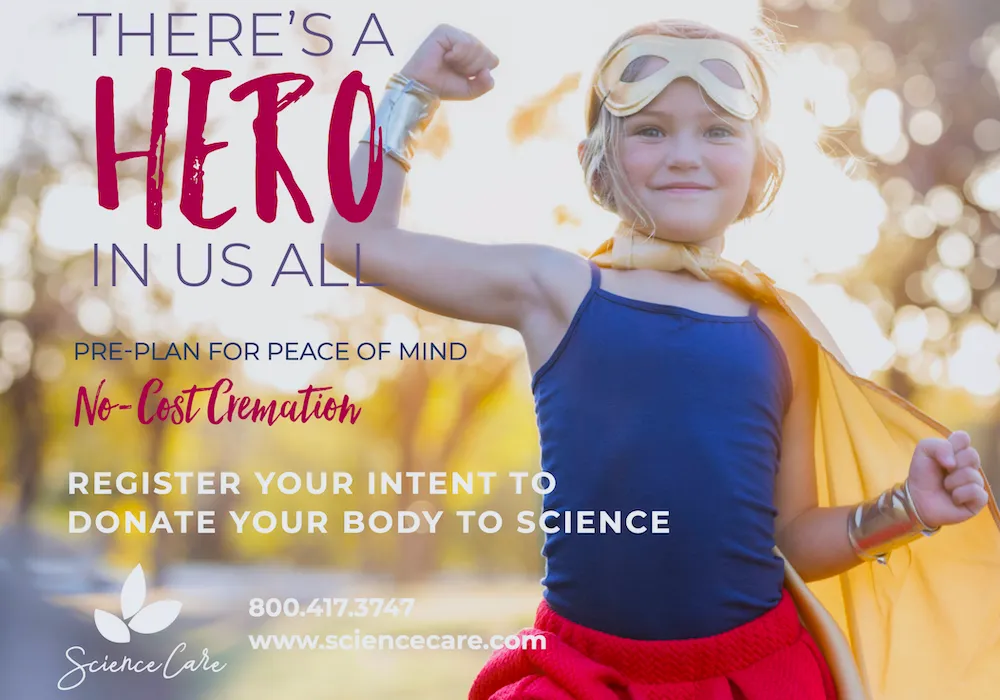
Medical Research & Education Projects

Heart disease: The leading cause of death for men and women
About one person every 37 seconds dies in the United States alone from cardiovascular disease.
Heart-specific procedures and advancements supported by Science Care donors:
- Percutaneous coronary intervention (Angioplasty)
- Coronary artery bypass
- Valve replacement
- Leadless pacemaker technology

Cancer: The #2 leading cause of death in the U.S.
The death rate from all cancers in the U.S. has dropped by an estimated 26% since 1991.
Cancer-specific procedures and advancements supported by Science Care donors:
- Surgical removal procedures, both general and robotic
- Biopsy research of healthy and diseased cancer tissues
- Early detection platforms to diagnose specific cancers early
- Technology allowing physicians to treat hard-to-reach disease areas
Science Care donors impact medicine in all areas
Donors who donate their body to science make it possible for surgeons and doctors to train on new procedures, scientists to develop new medical treatments, companies to develop safe medical devices, and patients to experience reduced post-surgery recovery times and infections.

Respiratory disease
The most common conditions include chronic obstructive pulmonary disease (COPD), bronchitis, emphysema, and asthma.
Chronic lower respiratory-specific procedures and advancements supported by Science Care donors:
- Surgery to relieve symptoms of COPD
- Technology advancements for treatment of emphysema
- Medical device development for bronchoscopy and endoscopic procedures

Free eBook: Learn More
See even more ways in which body donors have helped to advance science.
Download Now
Robotic surgeries
New types of robotic-assisted surgeries are becoming available each year, allowing us to experience safer, less invasive, and more precise procedures. Surgeons can now operate using only 1-2 cm incisions, with greater accuracy than ever before. Surgeons operate from a computer console, using hand controls to control the robotic arms.

Benefits can include:
- Faster recovery times
- Shorter hospital stays
- Lower risk of infection
- Smaller incisions and scarring
- Reduced blood loss
- Significantly less pain
Robotic-assisted surgeries supported by Science Care donors:
- General – Gallbladder, pancreatic cancer, acid reflux disease surgery, stomach surgery, inguinal hernia repair, gastric bypass, and many more
- Head and neck – Thyroid cancer, head and neck cancer, tongue resection
- Heart – Atrial septal defect, atrial fibrillation, coronary artery bypass grafting (CABG)
- Lung and thoracic – Esophageal cancer, lung tumors, thymectomy
- Gynecologic – Gynecologic cancers, uterine fibroids, ovarian cysts, endometriosis, hysterectomy, radical cystectomy, pelvic organ prolapse, myomectomy
- Urological – Prostate cancer, radical prostatectomy, bladder cancer, kidney disorders, kidney cancer, kidney transplant, colorectal cancer, rectopexy
- Orthopedics – Total hip replacement, total knee arthroplasty
- Spine – Spinal tumors, presacral tumors, vertebral augmentation, biopsies, osteotomies
More about robotic-assisted surgical systems
While these robots don’t “do” any surgeries — the decisions and actions are still performed entirely by the surgeon — the robots help to enhance the skills and capabilities of the surgeon.
The advanced platforms used include very small high-resolution cameras and multiple arms. Each of the arms is equipped with small surgical instruments that can rotate 360 degrees. Complex surgeries can be completed with just a few small incisions.

Medical training for organ transplant teams
Everyday lives are impacted by lifesaving organ donation, as well as body donation to science. Both transplant recovery teams (they recover organs for transplantation) and transplant teams (they perform the live transplant) benefit from the gift of body donation to science.
It is through education and extensive training that organ donation continues to push the limits and find new ways to change the world for victims of traumatic medical circumstances.
It often takes extensive practice and rehearsal to orchestrate a successful organ transplant. Every single movement and step are outlined in advance and often practiced many times before the actual transplant surgery takes place on a live donor recipient.
This is where body donation to science comes in — without the gift of donation to science, doctors would be learning and exploring on live patients. It is accuracy throughout the process that makes organ transplant a miracle for so many people.

Training in action
- From UChicago Medicine: See how physicians replaced the failing hearts, livers, and kidneys of two 29-year-olds in just 27 hours.
- From UPenn Medicine: See how surgeons performed the first bilateral hand transplant in a child.

Cochlear implants
Cochlear implants are electronic devices that can partially restore hearing. Cochlear implants are typically an option for patients with extensive inner ear damage who have not successfully benefited from hearing aids. Body donors to science have helped to develop and test this technology for many years.

Some of the benefits to cochlear implants are:
- Not needing visual cues to hear speech
- Identifying the direction of sound
- Ability to hear the phone or watch television
- Ability to recognize everyday sounds










